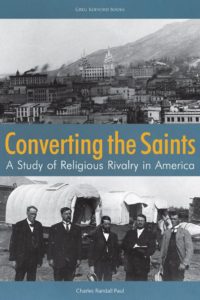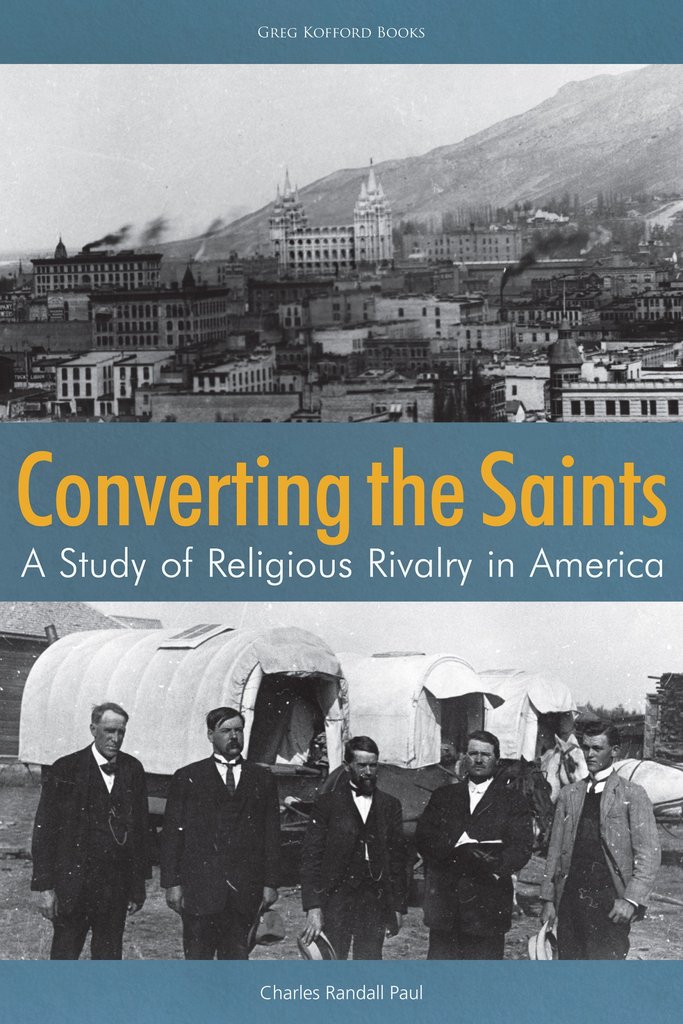 This episode celebrates a new book by Charles Randall Paul, Converting the Saints: A Study of Religious Rivalry in America (Greg Kofford Books), but even more so the ways he thinks about how we should engage all conflicts over ideas and claims for which there are no clear ways of measuring value or correctness. His direct study in this book examines three different sets of Protestant missionaries in the early twentieth century who came to Utah to convert Mormons to “true Christianity,” as well as the different approaches and strategies each employed. These historical examples are placed in very rich context–not only historical and religious but also theoretical. In Paul’s hands, the case of Protestant attempts at persuasive engagement in Utah illustrate fundamental keys to understanding conflict between values and ideals in many, many situations: certainly political and economic, but also in more directly personal interactions between spouses and partners, wider families, and religious communities themselves. Basically, any situation in which conflicts over deeply important issues that are ultimately unresolvable arise.
This episode celebrates a new book by Charles Randall Paul, Converting the Saints: A Study of Religious Rivalry in America (Greg Kofford Books), but even more so the ways he thinks about how we should engage all conflicts over ideas and claims for which there are no clear ways of measuring value or correctness. His direct study in this book examines three different sets of Protestant missionaries in the early twentieth century who came to Utah to convert Mormons to “true Christianity,” as well as the different approaches and strategies each employed. These historical examples are placed in very rich context–not only historical and religious but also theoretical. In Paul’s hands, the case of Protestant attempts at persuasive engagement in Utah illustrate fundamental keys to understanding conflict between values and ideals in many, many situations: certainly political and economic, but also in more directly personal interactions between spouses and partners, wider families, and religious communities themselves. Basically, any situation in which conflicts over deeply important issues that are ultimately unresolvable arise.
In this discussion with Mormon Matters host Dan Wotherspoon, Randy (as Dan calls him because of their nearly thirty-year friendship) offers terrific insights about interpersonal and group dynamics that truly make real, practical sense, shares a bit about the case studies this book includes, and then offers a glimpse into his ideas for, what Richard Bushman says is, “a compelling course of action for transforming harsh conflict to peaceful contestation.”
Hint: Randy’s proposals call for our more fully owning our own truths and then engaging in attempts to persuade others that ours in the truest view or the best way to approach important questions and problems–and allowing others to openly and vulnerably share theirs with us. These engagements, however, are dangerous as we just may realize areas in our sureties that deserve for our taking another look at, or even that we might become fully convinced by the others and possibly begin to align ourselves with their communities and causes. In short, Randy is calling for far more open-hearted, fully-owned, vulnerable and receptive engagement by “missionaries”–whether religious in nature, or political, economic, philosophical, or something else. He encourages all of us to be willing to come to the arena, agree to follow certain conventions, internalize key attitudes toward the nature of the contestation we are getting involved in, and to then go for it even as we understand that what might unfold there (or “in” us) is unpredictable.
Randy is energetic and engaging, and his insights fresh and very much needed at this time within the United States and rest of the world, as well as within Mormonism as it stands at this crossroads with how to engage intra-religiously and interpersonally with Saints who see things differently than many in leadership (or at least in terms of what they feel able to say publicly) and the majority of those in the pews. This episode is a must listen! Be prepared, though, as you might possibly become changed in some fundamental ways through your engagement with others!
_____
Links:
Charles Randall Paul, Converting the Saints: A Study of Religious Rivalry in America (Greg Kofford Books, 2018)
“The Way of Openness,” principles and attitudes that guide the types of interactions with others that Randy’s foundation, The Foundation for Religious Diplomacy,” and used in his online program, The World Table.”
_____
Colorado Faith Forums website. Learn about its annual symposium, 15 September 2018, Parker, Colorado
Mormon Matters Retreat, 12-14 October, Salt Lake City. Click here for details, registration information, and about scholarships to attend or to help others attend.


Comments 1
Dan, this has been one of my favorite episodes.
It is a radical idea to consider the benefits of open proselyting.
You’re right that today we are in a position of not wanting to contaminate our thoughts with other people’s ideas.
Yet our society doesn’t have a healthy set of rules to engage in differences, nor are they dojo masters everywhere ensuring a balanced respectful debate of ideas.
Perhaps we can have politician advocate for such things even though they are poor examples presently of what engaging in different beliefs look like.
I’m not so sure that having missionaries (not terrorists) reduces risks to society, but it is an interesting thought. I do think we should create a sandbox with social rules for engagement are permitted, but I thought that’s what having public areas (such as cafe’s and clubs) were for. However, history has proven that if we are too different then we become threats to the general society and we risk being exterminated. Hopefully we are not too different already.